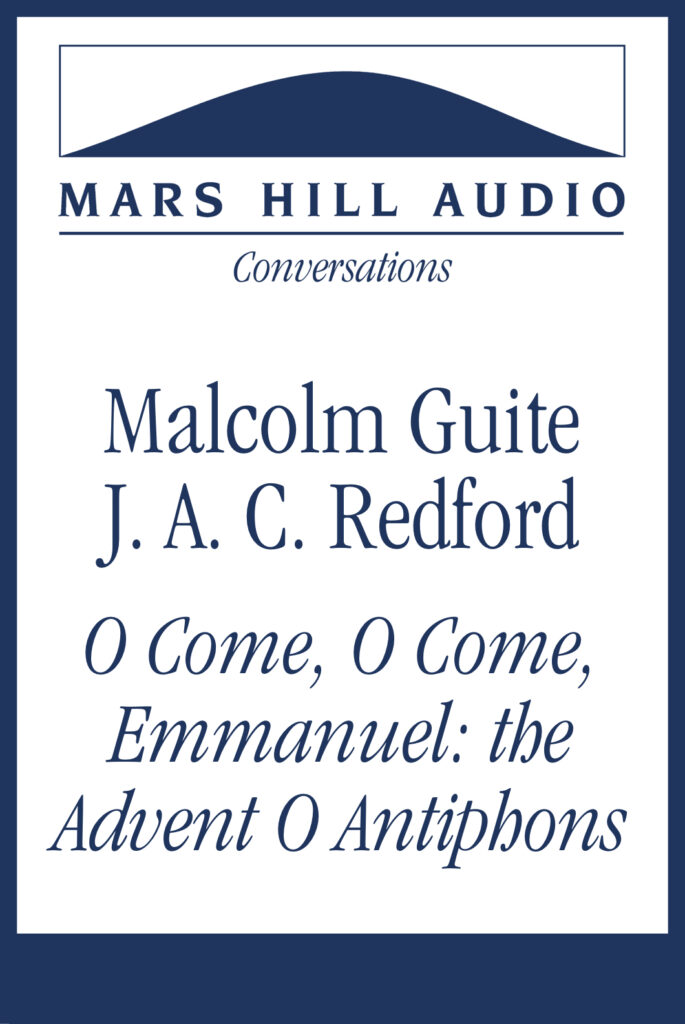released 12/13/2018
The familiar Advent hymn “O Come, O Come, Emmanuel,” itself a translation of the Latin hymn Veni, veni, Emmanuel, is a summary of the early liturgical plainchant antiphons that were traditionally sung during the week before Christmas. Known as the “O Antiphons,” these chants were sung in vespers services as liturgical responses on either side of Mary’s Magnificat. Each antiphon highlights a scriptural reference to Christ — O Sapientia, O Adonai, O Radix Jesse, O Clavis David, O Oriens, O Rex Gentium, and O Emmanuel — by way of preparation for Christ’s coming.
The original order of the antiphons is a bit different than the order of verses that appears in the hymn we sing today. Emmanuel is, in the traditional structure, the name invoked on the last of these seven nights. O Sapientia was originally the first of the seven, and the Latin text translates as: “O Wisdom, coming forth from the mouth of the Most High, reaching from one end to the other mightily, and sweetly ordering all things: Come and teach us the way of prudence.”
In this Conversation, poet and priest Malcolm Guite talks about his seven sonnets corresponding to the seven “O Antiphons.” Also included in this Conversation is an interview with composer J. A. C. Redford, who collaborated with Malcolm Guite to set Guite’s seven “O Antiphons” to music for unaccompanied choir. In these interviews, the poet and composer discuss how poetry and liturgy invite repetition, and how music can be an interpretation of a text so as to aid how one “inhabits” poetry over time.
64 minutes
PREVIEW
The full-length track for this audio is only available to paid members and to listeners with a free Visitor’s Pass. If you are a member, log in here. If you would like a Visitor’s Pass, sign in here. You may purchase one of our complete memberships here. Happy listening!
Related reading and listening
- The Transformed Vision of Samuel Taylor Coleridge — Poet Malcolm Guite explores the dramatic and even prophetic parallels between the life of Samuel Taylor Coleridge and that of the titular character in his famous poem “The Rime of the Ancient Mariner.” (59 minutes)
- Seven Messianic titles, seven attributes of Christ — Ken Myers introduces listeners to four composers who each have set all seven of the O Antiphons to music. (17 minutes)
- A prophetic “wake-up call” — In this 2024 lecture honoring the bicentennial of George MacDonald’s birth, Malcolm Guite explores MacDonald’s power to awaken readers’ spirits and effect in them a change of consciousness. (59 minutes)
- Seasons and everyday saints — Sylvie Vanhoozer introduces a French Advent tradition that involves a community of “little saints” whose stories have something to teach us about following Christ throughout the year. (28 minutes)
- The rediscovery of meaning — Poet and theologian Malcolm Guite explains Owen Barfield’s idea of the development of consciousness over time, an evolution made evident through language that reveals an earlier, pre-modern way of seeing the world. (63 minutes)
- Martyrdom and music — To mark the feast day of the Martyrdom of Polycarp, we offer an interview from 2004 with composer J. A. C. Redford and poet Scott Cairns about their work together on an oratorio based on the story of Polycarp’s death. (15 minutes)
- Redford, J.A.C. — FROM THE GUEST PAGE: J.A.C. Redford is a composer, arranger, orchestrator and conductor of concert, chamber and choral music, film, television and theater scores, and music for recordings.
- The music and the notes are precious — Ken Myers encourages an understanding of the Church as a particular culture that should be nourished and sustained, and then describes the history of an Advent hymn written by St. Ambrose. (27 minutes)
- The mysteries and glory of Christmas and its music — Ken Myers presents examples of music from five centuries that captures some sense of the astonishing fact of the Nativity of our Lord. (26 minutes)
- Insights into reality itself — Malcolm Guite on the philosophical concerns underlying Coleridge’s The Rime of the Ancient Mariner
- The story of the demotion of stories — Malcolm Guite on the Enlightenment’s rash dismissal of poetic knowledge
- Beckoning to wisdom — Poet Malcolm Guite and composer J.A.C. Redford talk about their collaboration on a song cycle inspired by the O Antiphons of Advent. (22 minutes)
- The Incarnation presented in music — Composer J.A.C. Redford talks about the theme of the Incarnation as musically presented in his choral symphony for Christmas entitled “Welcome All Wonders.” (23 minutes)
- Walter Hooper, R.I.P., and Christina Rossetti’s Advent poems — Walter Hooper (1931-2020) describes his first meeting with C. S. Lewis, a man he so admired and long served. In a second chapter in today’s Feature, Emma Mason explains how Christina Rossetti’s hopeful eschatological beliefs influenced the poems she wrote about the season of Advent. (21 minutes)
- Mars Hill Audio Journal, Volume 144 — FEATURED GUESTS:
Jonathan Mcintosh, Kevin Vost, Malcolm Guite, R. David Cox, Grant Brodrecht, and Peter Bouteneff
- Mars Hill Audio Journal, Volume 132 — FEATURED GUESTS:
David I. Smith, Susan Felch, D. C. Schindler, Malcolm Guite, and J. A. C. Redford
- Mars Hill Audio Journal, Volume 67 — FEATURED GUESTS: Eric O. Jacobsen, Allan C. Carlson, Terence L. Nichols, R. R. Reno, David Bentley Hart, J. A. C. Redford, and Scott Cairns
